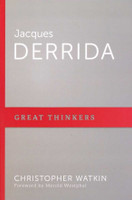
Watkin, Christopher
Description
Gilles Deleuze (1925–1995)
Gilles Deleuze gives us a sophisticated account of what happens to truth and ethics in a system that does not rely on God—and his thought makes visible how our society understands everything from knowledge and truth to sexuality and identity.
Christopher Watkin, a scholar of French literature and philosophy, presents Deleuze’s work in a way that is accessible to non-philosophers and brings his writing into sustained conversation with prominent biblical themes and with motifs from Reformed theology. As you engage with Deleuze’s thought, you will discover a model of cultural engagement that you can use to understand any contemporary or historical thinker or school.
“Watkin affords the Christian believer another fine entrée to participate in the philosophical life to which all humans are born: to understand both how Gilles Deleuze profoundly voiced our time, and also how very cool (adding to Peter Leithart’s designation of ‘weird’!) is the philosophizing that Christianity engenders. Christianity’s welcoming approach of the gospel breaks in and breaks open human thought and culture, as David Kettle describes it, winsomely rendering it more itself than it could otherwise be. And that’s true of Deleuze just as it was of Plato.”
—Esther Lightcap Meek, Professor of Philosophy, Geneva College; Author, Loving to Know: Introducing Covenant Epistemology
“A dear friend of mine in France seriously questioned his faith by reading Gilles Deleuze. He did return to the gospel, but might have done so sooner had he been able to read Watkin’s excellent volume. The author carefully and masterfully introduces us to Deleuze. One of the philosopher’s great appeals is his creative alternatives to typical atheism. Some of it sounds Christian: his celebration of difference; his critique of the chain of being; his appeal to dynamic, rather than static, ways of living. But it all ends up a brilliant caricature, and Watkin helps us see where Deleuze misses the boat. To boot, his presentation of the Christian worldview is marvelous. Why should any of this matter? If you think you have not been influenced by French poststructuralism, you need to think again. It’s in the cultural air we breathe. Watkin helps us clear away the smog. As someone I sat next to during a rather technical speech told me: ‘I don’t understand a lot of this, but I’m glad the speaker is on our side!’ Watkin does understand it, and he is on our side.”
—William Edgar, Professor of Apologetics, Westminster Theological Seminary
About the Author
Christopher Watkin (MPhil, PhD, Jesus College, Cambridge) researches and writes on modern and contemporary French thought, atheism, and religion.